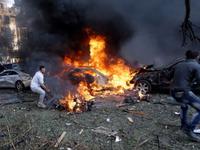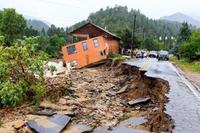-
Hezbollah blames Israel, but assassinated leader had many enemies

Hassan al-Lakkis, the man considered to be Hezbollah’s tech expert, known for his expertise with drones, bombs, and other gadgets, was assassinated near his home last week. Al-Lakkis’s body was not yet cold when Hezbollah operatives began to blame Israel for the assassination, despite al-Lakkis’ long list of enemies. Hezbollah’s support of Syrian President Bashar al-Assad has gained it a long list of enemies, and many experts insist that the assassination of al-Lakkis does not resemble an Israeli-styled operation.
-
-
EU to fund improved C3IS capabilities for African-led security operations
The EU on Friday confirm it will provide 12.5 million euros through its African Peace Facility to improve the command, control, communication, and information system (C3IS) used in African-led peace support operations. Since 2004 the EU has provided 1.1 billion euros to support peace and security operations in Africa.
-
-
James Bond drank too much to perform at the level depicted in books, movies
A detailed examination of James Bond’s books shows that Bond’s weekly alcohol intake is over four times the recommended limit for an adult male, putting him at high risk of several alcohol related diseases, such as alcoholic liver disease, cirrhosis, impotence, and alcohol-induced tremor, and an early death. The medical team concluded that it would not be realistic to expect Bond to have the capacity to perform (in all aspects of life) at his high level of alcohol intake.
-
-
U.S. “bomb library” marks 10-year anniversary
It has been ten years since the FBI established the Terrorist Explosive Device Analytical Center (TEDAC), and since that time the multi-agency operation — sometimes referred to as America’s bomb library — has become an important tool in the nation’s fight against terrorism. Since its creation in 2003, TEDAC has examined more than 100,000 IEDs from around the world and currently receives submissions at the rate of 800 per month. Two million items have been processed for latent prints — half of them this year alone.
-
-
India-Pakistan nuclear war would lead to world-wide famine: study
An India-Pakistan nuclear war may see the use of about 100 Hiroshima-size bombs – about half of India and Pakistan’s nuclear arsenals. A new study says that a nuclear exchange on such a scale would “probably cause the end (of) modern industrial civilization as we know it” by subjecting about two billion people to the risk of starvation, and causing massive economic and social disruptions far away from the theater of war. Among the consequences of a nuclear exchange: Chinese winter wheat production could decline by 50 percent during the first year and by more than 30 percent over ten years; there would be a 21 percent decline in Chinese middle-season rice production during the first four years and an average 10 percent decline in the following six years; corn and soybean production in the United States would decline by 10 percent on average for ten years.
-
-
Africa’s Sahel region threatened by terrorism, organized crime: Ban Ki-moon
Terrorism, trafficking in arms, drugs, and people, and other transnational forms of organized crime are threatening security in Africa’s vast sub-Saharan Sahel region, Secretary-General Ban Ki-moon warned the Security Council yesterday. He called for continued strengthening of The UN Multidimensional Integrated Stabilization Mission in Mali (MINUSMA), a 12,600-strong force set up by the Council in April and authorized “to use all necessary means” to carry out security-related stabilization tasks, protect civilians, UN staff, and cultural artefacts in the cou8ntry, and create the conditions for provision of humanitarian aid.
-
-
Improving the national ballistic data base
A team of researchers identified a number of areas of improvement in a national database of forensic ballistics evidence used to link guns to violent crimes. The report, just released by the National Institute of Justice, already has led to improvements in the system called the National Integrated Ballistic Information Network (NIBIN), which is operated by the Bureau of Alcohol, Tobacco, Firearms and Explosives (ATF).
-
-
DHS fires Black supremacist employee
DHS has fired Ayo Kimathi, the militant Black supremacist employee, after placing him on paid leave four months ago in order to conduct an administrative review of his conduct. Kimathi, who used to work in the procurement specialist at ICE, runs a Web site in which, among other racist rants, he calls for the mass killing of White people, describes President Barack Obama, Oprah Winfrey, and other successful African Americans as “black-skinned Uncle Tom race traitors,” and says that a woman’s primary role in life should be to “keep a strong Black man happy.”
-
-
Police cell-phone tracking raises privacy concerns

Law enforcement agencies around the country are using the International Mobile Subscriber Identity locator (IMSI catcher), known as Stingray, to track cellphone users for the purpose of assisting criminal investigations. Stingray masquerades as a cellphone tower, tricking phones into sending it a signal that law enforcement can later use to identify the serial number of the phone and track the subscriber or cellphone user. Privacy advocates are worried about widespread police tracking of cellphones and violations of privacy.
-
-
Effectively modeling and profitably insuring terrorism risk
The insurance industry continues to explore ways to insure against terrorism risk, finding it a challenge despite developing various methodologies to measuring the likelihood of a terrorist attack. Terrorism experts in the insurance industry insist that because terrorism risk can be modeled, it can be effectively priced, and they note that several insurance companies are effectively modeling and profitably insuring terrorism risk today.
-
-
Colorado faces costly, lengthy challenge fixing flood-damaged roads

The Colorado Department of Transportation(CDOT) has met the 1 December 2013 deadline to reopen twenty-seven flood-battered highways in the state, but the department still faces major challenges in making permanent fixes to damage caused by September’s historic floods. The scope of the task is currently being evaluated as highway managers explore technological and engineering changes needed to keep about 485 miles of damaged roadway more resistant to mass flooding.
-
-
New Silicon Valley focus on cybersecurity
The last time Silicon Valley focused on cybersecurity was in the 1990s. That focus saw the emergence of two giants: McAfee and Symantec. The two companies remain the most recognizable household names, thanks to their traditional firewall and anti-virus products. Now they find the arena which they thought was their own encroached from two sides. On one side there are tech giants like Hewlett-Packard and Cisco Systems, which see new revenue opportunity in cybersecurity. On the other side there is a rush of start-ups backed by large investments of venture capital.
-
-
EU issues new manual for defending ICS against cyberattacks
ENISA, the EU’s cybersecurity agency, has issued a new manual for better mitigating attacks on Industrial Control Systems (ICS). ICS support vital industrial processes primarily in the area of critical information infrastructure such as the energy and chemical transportation industries, where sufficient knowledge is often lacking. As ICS are now often connected to Internet platforms, additional security preparations must be taken. ENISA says that the new guide provides the necessary key considerations for a team charged with ICS Computer Emergency Response Capabilities (ICS-CERC).
-
-
Federal IT spending to exceed $11 billion by 2018
A new report from Delteks, contracted spending on cybersecurity will continue to grow from nearly $9 billion in FY2013 to $11.4 billion in FY2018, driven by multiple initiatives aimed at improving the overall cybersecurity posture of federal agencies. Persistent threats, complex and evolving policy issues, and changing technologies highlight ongoing cyber-workforce shortages to drive investments despite constrained federal IT funding.
-
-
NSA planted sleeper malware in 50,000 computer networks
The NSA has planted 50,000 sleeper malware packages – in effect, digital sleeper agents – in more than 50,000 computer networks around the world. The agents, controlled by the NSA’s Tailored Access Operations (TAO) unit, can be activated on command to harvest information of cause disruption. To plant the digital agents, the NSA employed methods typically used by Internet scammers and fraudsters.
-
More headlines
The long view
Factories First: Winning the Drone War Before It Starts
Wars are won by factories before they are won on the battlefield,Martin C. Feldmann writes, noting that the United States lacks the manufacturing depth for the coming drone age. Rectifying this situation “will take far more than procurement tweaks,” Feldmann writes. “It demands a national-level, wartime-scale industrial mobilization.”
No Nation Is an Island: The Dangers of Modern U.S. Isolationism
The resurgence of isolationist sentiment in American politics is understandable but misguided. While the desire to refocus on domestic renewal is justified, retreating from the world will not bring the security, prosperity, or sovereignty that its proponents promise. On the contrary, it invites instability, diminishes U.S. influence, and erodes the democratic order the U.S. helped forge.
Fragmented by Design: USAID’s Dismantling and the Future of American Foreign Aid
The Trump administration launched an aggressive restructuring of U.S. foreign aid, effectively dismantling the United States Agency for International Development (USAID). The humanitarian and geopolitical fallout of the demise of USAID includes shuttered clinics, destroyed food aid, and China’s growing influence in the global south. This new era of American soft power will determine how, and whether, the U.S. continues to lead in global development.
Water Wars: A Historic Agreement Between Mexico and US Is Ramping Up Border Tension
As climate change drives rising temperatures and changes in rainfall, Mexico and the US are in the middle of a conflict over water, putting an additional strain on their relationship. Partly due to constant droughts, Mexico has struggled to maintain its water deliveries for much of the last 25 years, deliveries to which it is obligated by a 1944 water-sharing agreement between the two countries.
How Disastrous Was the Trump-Putin Meeting?
In Alaska, Trump got played by Putin. Therefore, Steven Pifer writes, the European leaders and Zelensky have to “diplomatically offer suggestions to walk Trump back from a position that he does not appear to understand would be bad for Ukraine, bad for Europe, and bad for American interests. And they have to do so without setting off an explosion that could disrupt U.S.-Ukrainian and U.S.-European relations—all to the delight of Putin and the Kremlin.”
How Male Grievance Fuels Radicalization and Extremist Violence
Social extremism is evolving in reach and form. While traditional racial supremacy ideologies remain, contemporary movements are now often fueled by something more personal and emotionally resonant: male grievance.
